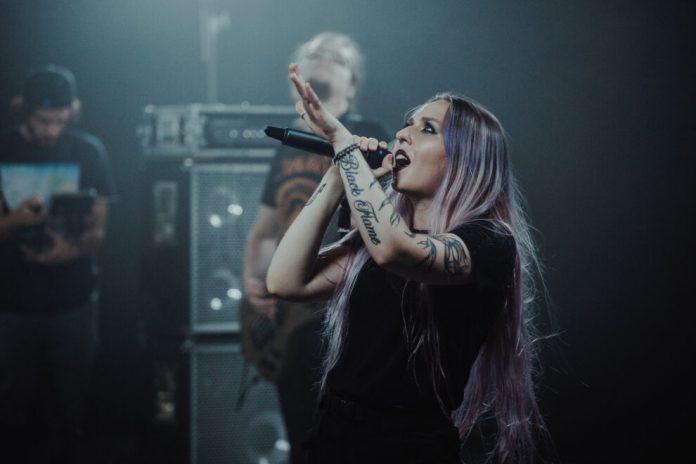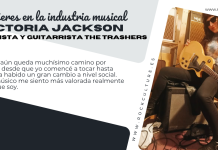¡Hola! Muchas gracias por dedicarnos tu tiempo. Antes de nada, me gustaría que nos contaras ¿Cómo han sido tus inicios en la industria musical? ¿De dónde nació el interés por este sector?
¡Gracias por recibirme! Creo que siempre me gustó la música y me acompañó desde mi infancia. Sentía el ritmo, las melodías… Luego, estudié guitarra clásica en la escuela de música y probé a tocar en algunas bandas como guitarrista eléctrica, pero, en definitiva, acabé siendo cantante. Y, para ser sincero, IGNEA es la primera banda que tuve, si consideramos que tocaba canciones originales, era constante y tenía intenciones serias. También he trabajado mucho con letras, y en mis 20 años, dirigía una revista online ucraniana sobre música metal. Y ahora, también formo parte de The Flaming Arts Agency, una agencia de gestión y contratación de artistas de metal. Así que debo decir que me interesa tanto ser artista como estar al otro lado de la industria.
Cada vez podemos ver más la presencia de mujeres en carteles de festivales y otros eventos, pero aun así sigue predominando la presencia masculina en este ámbito ¿A qué crees que se debe? ¿Qué medidas piensas que deberían tomarse para ayudar a que esta situación cambie?
Creo que la igualdad no sólo significa la capacidad de participar y ser evaluado por igual. Creo que cuanto menos se preste atención al género, mejor. Es decir, la gente debe ser elegida por su talento y sus habilidades, no por ser hombre o mujer. Así que creo que no deberíamos cambiar nada ahora mismo, sino simplemente prestar atención a la música, no al género, y ser respetuosos con los demás.
¿Cuáles son las principales diferencias que encontraste a la hora de introducirte en el mundo musical siendo mujer?
Como antigua especialista en marketing, siempre trato de analizar lo que se vende mejor. Y sabes, hoy en día, es más fácil «vender» una banda que tiene una mujer en ella, especialmente, si esa mujer líder. Esa es la verdad, y creo que los hombres tienen más problemas para promocionarse hoy en día. Tal vez, no sea un pensamiento popular, pero esto es lo que realmente pienso.
Otro aspecto es que creo que las artistas femeninas se comparan más entre sí, por su aspecto, su voz, etc. Realmente no me gusta, y también es lo que he escuchado de mis compañeras. Es decir, rara vez se ven posts como: elige tu cantante masculino de metal favorito…
¿Ves un crecimiento de presencia de miembros femeninos en esta industria en los últimos años? ¿En que ves qué haya cambiado?
Desde luego, sí. Creo que hay más mujeres músicas que no sólo cantan, sino que también tocan varios instrumentos. Tenemos bateristas, bajistas, etc. Y creo que es maravilloso. También hay más productoras, propietarias de sellos, responsables de contratación que son mujeres. Es decir, nos estamos acercando al equilibrio, pero, de nuevo, sigo pensando que las habilidades, la experiencia y el talento deben estar en primer lugar.
¿Por qué mujeres te sientes inspirada? ¿Hay alguna con la que te haría especial ilusión trabajar?
Me inspira mucho Amalie Bruun (Myrkur), que es una multiinstrumentista, gran compositora y una mujer que ha conseguido crear un proyecto musical de éxito en torno al black metal; Cristina Scabbia, de Lacuna Coil, que también está investigando en Twitch y comunicándose con sus fans en línea; Charlotte Wessels (ex-Delain), que inició su página de Patreon y la convirtió en un gran éxito; Cathy Pellow, que creó el sello Sargent House y presentó a muchos artistas destacados en este mundo; Melissa Cross, que se hizo un nombre enseñando vocalismo extremo, etc. Podría hacer una lista bastante larga aquí.
¿Cuáles son las artistas que ves dentro del sector que sirven como referencia para nuevas generaciones?
Bueno, creo que aquí, las respuestas serían muy comunes porque hace unas décadas, no había tantas mujeres músicas y artistas de hecho. Así que, basándome en lo que escucho de otros y también incluyendo mis referencias, diría que Simone Simmons, Cristina Scabbia, Floor Jansen, Anneke van Giersbergen, Angela Gossow, Doro Pesch, Liv Kristine, Tarja Turunen, Lzzy Hale, Otep Shamaya y Sharon del Adel. Por supuesto, es imposible enumerar a todos.
Siendo mujer siempre se juzga más la apariencia, algo que en los hombres parece no ser tan relevante ¿Ha influido tu aspecto físico en algún sentido a la hora de trabajar en este sector?
Bueno, por supuesto, me doy cuenta de que hay un cierto porcentaje de personas que fueron conducidas a nuestra música debido a mi apariencia. Pero esto no es lo que me molesta. Diría que siento más desigualdad en el hecho de tener que dedicar más tiempo a mi aspecto en comparación con los hombres. Tomemos como ejemplo las giras. Necesito más cosas para llevar conmigo y más tiempo para prepararme para el escenario que los miembros de mi banda. Eso es injusto.
¿Hay alguna situación que hayas vivido en esta industria por ser mujer que te haya marcado?
Hasta ahora, no se me ocurre nada parecido.
¿Piensas que en este sector prevalece la sororidad ante la envidia o al contrario?
Según mi experiencia, tenemos una conexión muy estrecha entre las mujeres músicas. Nos mantenemos en contacto y nos apoyamos mutuamente. Y son sobretodo los oyentes los que intentan crear una especie de concurso para nosotras haciendo clasificaciones e intentando elegir quién es la mejor. Espero que esto cambie en algún momento.
En esta situación que estamos viviendo la cultura está siendo más afectada respecto a otros sectores ¿Cómo lo estás llevando?
Los últimos 1,5 años de pandemia han sido realmente extraños para mí y para la banda. Por un lado, nos sentíamos atrapados en nuestras casas, sin posibilidad de hacer giras, conseguir inspiración, etc. Por otro lado, tuvimos un exitoso lanzamiento de nuestro último álbum, una base de fans que nos apoya en todo el mundo, y es durante este tiempo que logré dejar todos los trabajos no relacionados con la música. Pero, creo que todo se debe a que hemos estado construyendo un fuerte apoyo en línea para nuestra banda y no sólo dependíamos de las giras. Pero, ¡estamos deseando volver a la carretera con tantas ganas!
Para ir finalizando, ¿Os gustaría dejar algún mensaje a los lectores de Rock Culture?
Me gustaría desearles a los lectores de Rock Culture que sean más abiertos de mente y apoyen a los artistas. No intenten compararnos, sino que disfruten de la música que estamos creando para vosotros. Y, por supuesto, ¡manteneos seguros y nos vemos pronto en el renacimiento de los conciertos!
Hello! Thank you very much for giving us your time. First of all, I would like you to tell us how were your beginnings in the music industry? Where did the interest in this sector come from?
Thanks for having me! I think I always loved music and it accompanied me from my childhood. I felt rhythm, melodies… Then, I studied classical guitar at the music school and tried playing in a few bands as an electric guitar player but all in all, I ended up as a singer. And, to be honest, IGNEA is the first band I had, if we consider playing original songs, being regular, and having serious intentions. I also have been working with texts a lot, and back in my 20s, I was running a Ukrainian online magazine about metal music. And now, I’m also a part of The Flaming Arts Agency, a management and booking agency for metal artists. So, I must say that I have interest to both being an artist and looking at another side of the industry as well.
We can see more and more the presence of women in line-ups of festivals and other events, but even so, the male presence continues to predominate in this area. What do you think this is due to? What steps do you think should be taken to help this situation change?
I think that the equality means not only the ability to equally participate and be evaluated. I believe that the less we pay attention to gender, the better. Meaning, people should be chosen for their talent and skills, not because they’re male or female. So, I believe that we shouldn’t change anything right now but simply pay attention to music, not gender, and be respectful of each other.
What are the main differences that you found when entering the musical world as a woman?
As a former marketing specialist, I always try to analyze, what sells better. And you know, nowadays, it’s easier to ‘sell’ a band that has a woman in it, especially, if she’s a frontwoman. That’s the truth, and I think that men have more problems with promoting themselves nowadays. Maybe, it’s not a popular thought, but this is what I truly think.
Another side is that I feel that female artists get more comparison between each other, for their appearance, voice, etc. I truly don’t like it, and it’s also what I heard from my fellow female colleagues. I mean, you rarely see posts like: choose your favourite male metal singer…
Do you see a growth in the presence of female members in this industry in recent years? Where do you feel things have changed?
Absolutely, yes. I feel that there are more female musicians who not only sing but also play various instruments. We’ve got drummers, bass players, and so on. And I think that it’s wonderful. There are also more producers, label owners, booking managers who are women. I mean, we’re getting closer to the balance, but again, I still feel that skills, experience, and talent should be in the first place.
Which women inspire you? Is there any you would be especially excited to work with?
I’m very much inspired by Amalie Bruun (Myrkur) who is a multi-instrumentalist, great composer, and a woman who managed to create a successful musical project around black metal; Cristina Scabbia of Lacuna Coil who is also looking into Twitch and communicating with her fans online; Charlotte Wessels (ex-Delain) who started her Patreon page and made it a big success; Cathy Pellow who created Sargent House label and introduced many outstanding artists to this world; Melissa Cross who made her name in teaching extreme vocals, and so on. I could make quite a long list here.
In this sector which are the female artists that serve as a reference for new generations in your opinion?
Well, I believe that here, the answers would be very common because a few decades ago, there were not so many female musicians and artists indeed. So, based on what I hear from others and also including my references, I’d say Simone Simmons, Cristina Scabbia, Floor Jansen, Anneke van Giersbergen, Angela Gossow, Doro Pesch, Liv Kristine, Tarja Turunen, Lzzy Hale, Otep Shamaya, and Sharon del Adel. Of course, it’s impossible to list everyone.
Being a woman, appearance is always judged more, something that in men seems not to be so relevant. Has your physical appearance had an influence in any way when working as a musician?
Well, of course, I realize that there’s a certain percentage of people who were driven to our msuic because of my apperance. But this is not what bothers me. I’d say, I feel more inequality in the fact that I need to spend more time on my appearance compared to men. Let’s take touring for example. I need way more stuff to carry with me and way more time to make myself stage-ready than my band members. That’s unfair!
Has there been any situation that you have experienced in this industry for being a woman that left a mark on you?
So far, I cannot think of anything like that.
Do you think sisterhood prevails over envy in the music world or is It the other way around?
Based on my experience, we have a very tight connection between female musicians. We’re staying in touch and are very supportive for each other. And it’s mostly listeners who are trying to build some kind of a contest for us by making rankings and trying to choose who’s best. I hope it changes at some point.
In this pandemic situation that we are experiencing, culture is being more affected compared to other sectors. How are you taking it?
The past 1.5 pandemic years have been really strange for me and the band. On the one hand, we felt trapped in our homes, without any ability of touring, getting inspiration, etc. On the other hand, we had a successful release of our latest album, a supportive fanbase all over the world, and it’s during this time that I managed to leave all non-music related jobs. But, I think it’s all because we’ve been building a strong online support for our band and weren’t only depending on tours. But oh, we’re waiting to get back on the road soooo badly!
To finish, would you like to leave a message to the readers of Rock Culture?
I’d like to wish the readers of Rock Culture to be more open-minded and supportive to artists. Don’t try to compare us but enjoy the music that we’re creating for you! And, of course, stay safe and see you at the re-birth of shows soon!







